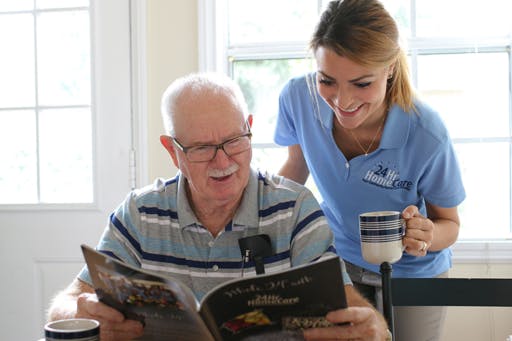How to Improve Quality of Life While Living with Alzheimer’s

If you or your loved one has been diagnosed with Alzheimer’s, you may be concerned about their quality of life moving forward.
It is important to note that if your loved one has been suffering from symptoms of Alzheimer’s, they have not had their “normal” life for quite some time. Instead of trying to get your loved one back to their “normal” it is important to recognize that there will be a new norm and that will be living with Alzheimer’s. It is possible to live a happy and fulfilled life with Alzheimer’s, with the help of a caring support system, a healthy perspective on life and the right technology. We encourage you to seek out ways to adapt to having Alzheimer’s without impeding on your quality of life.When an individual is diagnosed with Alzheimer’s his or her doctor will have likely gone over a care plan with them. These care plans should include what the patient is or is not cleared to do. It is important to consult with a medical professional before you commit yourself or your loved one with Alzheimer’s to an exercise plan. If you or your loved one did not exercise before their diagnosis, it is important to start slow and work your way up to a more challenging exercise plan. Please consult a medical professional about the level of intensity that should be pursued.
Exercise can be very beneficial for individuals suffering from Alzheimer’s disease for a multitude of reasons. Exercise is known to increase endorphins within your body, which elevates mood and fosters a more positive attitude. In patients with dementia, exercise can greatly help reduce the risk of depression. A simple brisk walk could be the difference between you or your loved one feeling positive and uplifted or feeling down and sad.

Exercise can help improve several factors of daily living, such as quality of sleep and their ability to perform their every day tasks. For example, if an individual participates in 30 minutes of exercise a day, they will likely have increased energy during the day (especially after their workout) and will be able to sleep soundly at night. Physical activity can also help an individual with Alzheimer’s stay strong and can carry out certain activities of daily living such as getting dressed, walking around their home and having the energy to socialize with others.
It is common for individuals with poor heart health may also have declining cognitive health and may develop Alzheimer’s. If you or your loved one has Alzheimer’s and suffers from heart disease or illness, exercise can help your heart grow and stay strong over time. Please consult your doctor about the level of physical activity that you should carry out before doing so.
Consider hiring a caregiver that can help encourage your loved one to exercise and can help oversee their exercise regimen.
Hiring a caregiver can give you peace of mind that you or your loved one is safe while performing their exercises.
Technology has come a long way in the past several years. Thankfully, there is wearable technology that allows the elderly individual to press a simple button if they are in distress and need help. 24 Hour Home Care has partnered with Philips Lifeline medical alert system to help provide seniors with easy-to-wear technology that can save their life. Philips Lifeline system allows your loved one to have the ability to ask for help and to monitor their activity.

Our caregivers will make sure all devices in the home are working, up to date and are accessible for you or your loved one. If you would like to find out more information regarding how you can order Philips Lifeline products and have a free installation of your products.Alzheimer’s symptoms may include feeling lost, agitated and confused due to their declining cognitive health. The biggest battle that an Alzheimer’s patient will face is within their own mind. Companionship and socialization can provide an escape for you or your loved one by being a shoulder to cry on, someone to listen and most importantly for someone to just be there.
Companionship can be anything from simply sitting next to the person while he or she watched television, or it can mean participating in activities of daily living, such as grocery shopping or bathing. Companionship is important for an individual with Alzheimer’s because it allows them to feel safe and as though they are not alone in their battle. By having someone there, whether that is a family member or a caregiver, the feeling of comfort and ease will not be lost. Alzheimer’s can cause tremendous confusion and loneliness, leading to depression and anxiety. Giving your loved one the gift of companionship can change their life and give them the quality of life they deserve. Caregivers can bring a sense of ease and peace to an otherwise hectic time. If you or your loved one has been diagnosed with Alzheimer’s, a caregiver might be the solution you are looking for. Quality of life does not have to suffer due to an Alzheimer’s diagnosis. Our caregivers are trained to provide companionship, medication reminders, meal preparation and light housekeeping. During your times of need, our caregivers will step in and be there to make your day easier.

With our caregivers, you or your loved one will be able to feel comfortable that we will remind you when it is time to take the appropriate medication. Medication reminders can save lives, as Alzheimer’s patients often forget to take their medicine or the proper dosage to take. Our caregivers can ensure your loved one is taking the medications they need, such as Donepezil, Galantamine, Memantine or simple vitamins. As most Alzheimer’s patient forget more than just medication, our caregivers will also ensure that the client with Alzheimer’s eats a proper and nutritious meal at the appropriate time. Furthermore, a caregiver can provide an extra set of hands to make sure that the clients’ home is clean, safe and will foster a positive attitude for the client.
Our caregiver’s focus is to allow the client and their family to feel at ease with an extra set of hands assisting their loved one.
Allow our caregiver to give you the care that you and your family deserves.
